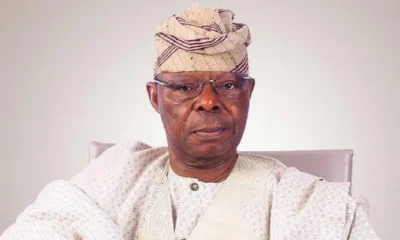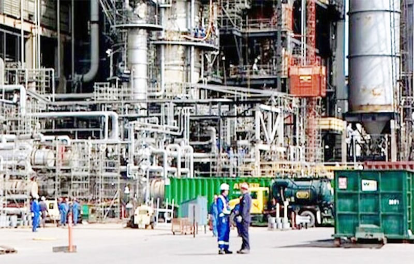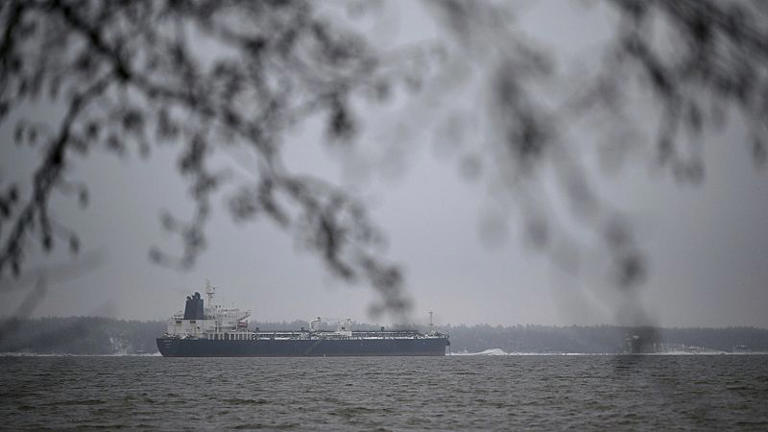Business
IMF Explains Why Naira is Bouncing Back
Published
5 months agoon
By
Ekwutos Blog
IMF analysis reveals why the naira is bouncing back, highlighting reforms and global market conditions aiding its recovery.
The International Monetary Fund (IMF) has suggested that Nigeria’s currency, the naira, is starting to stabilize due to recent economic interventions.
The IMF credited this development to the Central Bank of Nigeria’s (CBN) efforts in addressing outstanding foreign exchange backlogs and increasing interest rates, actions intended to stabilize the economy.
At a press briefing held in Washington DC on Tuesday, the IMF recognized the effects of these policies.
The IMF reported that in Nigeria, increasing rates and settling overdue domestic central bank foreign exchange obligations have contributed to the naira demonstrating greater stability.
During the same conference, Tobias Adrian, who serves as the IMF’s financial counsellor and director of monetary and capital markets, emphasized the CBN’s advancements in controlling inflation and stabilizing the foreign exchange market.
Adrian stated, “We welcome the central bank’s shift to an inflation-targeting regime and its liberalization of the exchange rate.”
He reaffirmed the suitability of the CBN’s rate hikes due to ongoing inflation issues. “The implemented rate increases have been fitting, particularly considering the challenges brought on by high inflation, which remains around 30 percent.”
In 2024, the naira has encountered significant challenges despite recent advancements. According to a report by the World Bank on October 16, it continues to be one of the weakest-performing currencies in sub-Saharan Africa.
The report connected the currency’s decline in value to a rise in demand for dollars and inadequate foreign currency inflows.
The IMF observed indications of recovery in recent months, with the naira oscillating between N1,700 and N1,600 per dollar in the parallel market and stabilizing within a range of N1,500 to N1,600 in official exchange markets.
You may like


‘There is hunger in the land, we need to rescue Nigeria from APC’ – Ex- Reps member, Shina Peller


Alleged N30bn fraud: Court orders Nigerian billionaire, Oba Otudeko to appear for trial


EFCC impounds trucks of illegal solid minerals in Benue


EFCC Arrests Kano TikTok Influencer, Murja Kunya for Alleged Naira Mutilation


Impeachment: Rivers State House of Assembly Serves Gross Misconduct Allegation Notice On Fubara, Deputy Gov


Youth election claims life in Imo
Business
Why retailers, marketers dump Dangote Refinery petrol for import – Stakeholders
Published
7 days agoon
March 11, 2025By
Ekwutos Blog
Petroleum Products Retailers and marketers have explained why petrol imports have persisted despite the Dangote Refinery and other local refineries’ production capacity.
The President, Petroleum Products Retail Outlet Owners Association and the Chairman, Major Marketers Association of Nigeria, Billy Gillis-Harry and Tunji Oyebanji in an exclusive interview with Ekwutosblog on Monday cited fear of healthy market competition, competitive pricing and inadequate petrol production capacity as reasons for the product’s continued import.
This comes amid the National Bureau of Statistics’ foreign trade data showing that petrol imports surged by 105 percent to N15.4 trillion at the end of 2024.
Similarly, the report indicated that fuel imports hit N930 billion in February 2025 alone, raising concerns among stakeholders in the country’s downstream sector.
Recall that the Nigerian Midstream and Downstream Petroleum Regulatory Authority said that Dangote Refinery, Port Harcourt and Warri refineries met only 50 percent of the national petroleum products consumption requirement in February 2025. #
However, in a statement last month, the president of Dangote Refinery countered NMDPRA and insisted that the $20 billion Refinery can meet 100 percent of Nigeria’s 100 percent petroleum production requirements.
Nigerians are now left in limbo amid the controversy as NNPC said it has not imported petrol so far in 2025.
Meanwhile, Gillis-Harry and Oyebanji in their insights to Ekwutosblog put clarity to the debate.
Speaking, Gillis-Harry insisted that petroleum retailers get their products from all sources, including Dangote Refinery, NNPC and import.
According to him, petrol retailers will continue to get fuel from sources with the best pricing to avoid a monopoly of the country’s petroleum downstream.
He frowned at a situation where the refinery would reduce fuel prices overnight without due consultation with its partners and retailers.
Gillis-Harry added that healthy competition and price stability must be guaranteed in Nigeria’s downstream sector for the good of Nigerians.
“Retailers are not running away from Dangote Refinery. We patronize every refinery, but we subscribe to full liberation so that we will not run a monopolized downstream sector.
“A situation where one refinery is shifting prices up and down without consideration of retailers is uncalled for.
“We cannot buy a product at N889, and over the night, the prices are dropped to N825, which is unfair.
“We continue to buy petrol from all sources that are profitable to us, either NNPCL, Dangote Refinery or through import”, he told Ekwutosblog.
On his part, Oyebanji explained that local refineries such as Dangote Refinery were not meeting 100 percent of domestic demand- the reason for fuel import to augment the vacuum.
According to him, if local refineries produced enough to meet the domestic market and with competitive prices, no right-thinking businessman would import.
“The report circulated today was for 2024. I don’t understand why it is being played up in the media as if it is new.
“Seems it is to advance a particular agenda. I don’t think local refineries are meeting 100 percent of local demand.
“So, to prevent shortages, some importation is being allowed, but to give the impression that such importation is growing isn’t correct.
“NNPCL, which has been the largest importer up to last year, has confirmed that they have not imported and yet someone is pushing this narrative.
“If local refineries produce enough to satisfy local demand and sell at a competitive price, then no right-thinking businessman will import”, he told Ekwutosblog.
Recall that earlier this month and last month, NNPC and Dangote refineries reduced petrol prices to between N860 and N880 per liter.
The development sparked a price war among the bigwigs in the country’s downstream sector, as Nigerians now buy petrol between N860 and N970 per liter nationwide.
On October 15, 2024, 650, 000 barrels per day, Dangote Refinery kicked off supply of petrol.
At the same, NNPC restarted petrol production at the Port Harcourt and Warri refineries in November and December 2024.
Business
Why food prices are crashing in Nigeria – Bwala
Published
1 week agoon
March 10, 2025By
Ekwutos Blog
The Special Adviser to the President on Media and Policy, Daniel Bwala, has suggested that food prices are crashing because President Bola Tinubu’s administration is addressing insecurity.
Bwala claimed that farmers now enthusiastically go to farm to cultivate food crops.
In a post on his X handle on Monday, Bwala urged Nigerians to ignore those peddling fake news that importation is the reason for the crash of food prices.
“The reason the food prices are crashing is because we have dealt a heavy blow to insecurity, hence farmers enthusiastically go to farm and do what they do best. Presdient Tinubu @officialABAT means bussiness.
“Ignore the sore losers who are peddling fake news that importation is the reason for crashing of the prices and that President Tinubu is destroying the economy of the north. Such individuals are probably not happy that we are dealing with insecurity.”
Business
Dozens brought ashore after oil tanker and cargo ship collide in North Sea
Published
1 week agoon
March 10, 2025By
Ekwutos Blog
An oil tanker and a cargo ship collided in the North Sea off the UK coast on Monday, triggering a major rescue mission.
UK authorities launched lifeboats and firefighting vessels to the scene some 10 nautical miles out from the city of Hull after an alarm was sounded at around 11 am CET, authorities said.
“A coastguard rescue helicopter from Humberside was called, alongside lifeboats … an HM Coastguard fixed-wing aircraft, and nearby vessels with firefighting capability,” a coastguard spokesperson said on Monday.
At least 32 casualties have been brought ashore, according to Martyn Boyers, chief executive of the Port of Grimsby East. Their condition is not immediately clear.
Initial reports showed fire and thick black smoke pouring from both ships. Boyers said that there had been a “massive fireball” when the vessels collided.
The incident involved a US-registered oil tanker, Stena Immaculate, and a Portuguese container ship called the Solong, registered in Madeira, according to ship tracking website Vessel Tracker.
The tanker was listed as sailing from the Greek port of Agioi Theodoroi, while the cargo vessel was on course from Grangemouth in Scotland to Rotterdam in the Netherlands.
The Stena Immaculate is the larger of two ships, listed as being 183 metres long and 32 metres wide. The Solong is 140.6 metres long and 21.8 metres wide, according to ship tracking site Marine Traffic.
The site data shows Solong was drifting at 0.3 knots according to its last tracked position.
The UK Coastguard says it was assessing a “likely” counter-pollution response, although it isn’t known what the oil tanker was carrying at the time of the incident.
UK Transport Secretary Heidi Alexander said she was “concerned” to hear of the collision between the two vessels. She thanked “all emergency service workers involved in their continued efforts in responding to the incident.”
The Met Office said visibility was poor in its morning forecast for Yorkshire and Humber.
“Areas of fog and low cloud lifting as winds increase through the morning, with some warm, if rather hazy sunny spells expected in places for a time,” the weather agency said.

‘There is hunger in the land, we need to rescue Nigeria from APC’ – Ex- Reps member, Shina Peller

Alleged N30bn fraud: Court orders Nigerian billionaire, Oba Otudeko to appear for trial

EFCC impounds trucks of illegal solid minerals in Benue
Trending

 Trending5 months ago
Trending5 months agoNYA demands release of ‘abducted’ Imo chairman, preaches good governance
- Politics1 year ago
Nigerian Senate passes Bill seeking the establishment of the South East Development Commission.
- Business5 months ago
US court acquits Air Peace boss, slams Mayfield $4000 fine

 Politics5 months ago
Politics5 months agoMexico’s new president causes concern just weeks before the US elections
- Entertainment5 months ago
Bobrisky transferred from Immigration to FCID, spends night behind bars
- Entertainment5 months ago
Bobrisky falls ill in police custody, rushed to hospital

 Politics5 months ago
Politics5 months agoRussia bans imports of agro-products from Kazakhstan after refusal to join BRICS

 Politics5 months ago
Politics5 months agoPutin invites 20 world leaders

